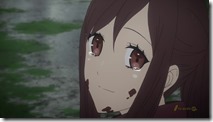 |
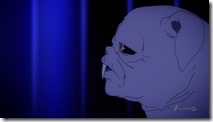 |
 |
There are a lot of things I want to say about this series, but I think it’s best to start with a simple one: a sincere thank you to the people who created it.
With a series as great as Shin Sekai Yori, endings are very, very hard. This was not something I was looking forward to, and that’s an understatement. In the first place the best series of the last two seasons is coming to a close, which is never a prospect to bring happiness. Then there was the obvious worry that – like so many fine shows before – it would struggle to craft an ending worthy of the rest of the series. Finally, this has been such a ruthlessly powerful story that there was every chance the ending would leave me shattered, even if it was a worthy one.
The funny thing is, my initial reaction to the episode was mild disappointment. I really felt I should wait a while before I even tried to put my thoughts down on paper, because I was having a hard time making sense of my emotional reaction. But over time, as I’ve thought about the ending and re-watched it, I’ve come to see it as something quite profound and in-keeping with the message of the series as a whole (mostly). I still have some issues with it, and there are still things from earlier episodes that I can’t square with what happened in this one. But in a landscape littered with the rotting carcasses of failed endings, this was a finale that will rank among the best of the year, for a series that will do the same.
Let’s start with something good, and there’s an awful lot of it. SSY observed the single-most important lesson that mediocre and worse endings for otherwise strong multi-cour shows teach us – you need to finish with a coda. Racing headlong to the finish with action just simply doesn’t work. It’s essential to have the climax of the main storyline come well before the actual end, because it’s the act of watching the characters come to terms with everything that’s happened that’s cathartic for the audience. In wrapping up the akki crisis in the first few moments of the episode, Shin Sekai Yori did just that. It might be argued that Kiromaru got short shrift or that the lack of an explosive final confrontation was an anti-climax, but I don’t see it that way. If what happened at the three-minute mark of this episode had happened at the twenty-minute mark, the episode would have been wholly unsatisfying.
Of course, SSY is adapted from a novel and as I’ve stated many times it, more than any series of recent memory, has been exquisitely paced. There was always a sense that we were watching historical events play out through an act of memory, never too fast and never too slow. So it’s hard to know just how much credit A-1 and the director and writer should get, and how much should go to novelist Kishi Yuusuke. But at the very least it’s no easy task to take a novel with perfect pacing and not screw it up by trying to make it more suitable for anime. No, if there’s anything that bothers me about the conclusion of the fiend storyline (apart from the fact that A-1 apparently did make the minor change of having Maria and Mamoru’s child be a girl, presumably for no other reason than to further fetishize Maria, which makes the fiend theory somewhat less plausible) it’s that killing the akki seems to invalidate all the soul-searching Saki has done over the last few episodes. Was there no meaning to Saki’s realization that the child was no fiend but merely someone who – in Saki’s own words – had “done nothing wrong” apart from a strategic one in figuring out how to kill it? And to further highlight the sense of tragedy? In the end, the akki that wasn’t is just another innocent who died for the sake of preserving what was left of civilization.
Indeed, there are a couple of elements that puzzle me in this fashion. I don’t really understand the quite obvious distance that was placed between Saki and Satoru after the final timeskip, given the fact that they ended up together in the end anyway. This is very odd, frankly, because what we got was a situation where there was obviously a deep personal bond and trust (even if it wasn’t romantic love) between the two of them at 12, at 14 and at the very end – and an inexplicable hole in the middle where they acted like strangers to each other. It’s also odd that Mamoru effectively disappeared from the timeline for a long stretch, never even being mentioned when talk turned to “the friend who died” and “Maria’s child” only to be remembered at the very end. The common thread here is Maria and an attempt to make her into a kind of spiritual focus of the series, especially when the change in ED is factored in. In the larger scheme of things it’s a fairly small issue, but it does represent the closest thing to a stumble over the course of 25 mostly brilliant episodes, and it’s probably coincidental neither that these are the most important changes from the novel, or that the character in question is the biggest name in the seiyuu cast.
In terms of Mamoru’s child and her death, I think perhaps the fault is with me – because I’m probably trying to project a redemptive quality to Shin Sekai Yori that it has no intention of shouldering. The meaning of this series isn’t in finding answers, it’s that there are no good answers. The sins that lie at the feet of the remains of civilization are grave and SSY has made no attempt to gloss over that fact. They’ve done terrible things to survive, most obviously the pre-emptive murder of countless of their own children. I don’t think Kishi-sensei is interested in absolving anyone of the responsibility of their crimes, only in showing us that decency does try to struggle on even in the darkest of times. The revelation that the Queerats are in fact humans doesn’t fundamentally change anything, in part because it’s something many of us have suspected all along. But it’s also just more fuel to the fire, not the flame that started it – further evidence that the remains of human society have committed more than enough crimes to make them undeserving of survival.
In thinking of this from the perspective of Satoru and Saki, it’s easy to say that their crimes are mitigated by the fact that they didn’t realize that in killing Queerats, they were killing humans. But when one stops to think about it, they certainly did realize that they were killing intelligent creatures with self-awareness, fully capable of reason, compassion and seemingly the full range of emotions they themselves were capable of. In this sense Squealer is exactly correct – the Queerats were treated as worse than slaves. Their very existence depended on the whim of their overlords, who often wiped out entire colonies over perceived transgressions. What Saki and Satoru did seems like self-defense, certainly – but in the end, can one truly blame Squealer for trying to seize the opportunity to turn the tables on the humans with the “wicked power”? As seemed likely all along, it’s not so much a question over which side was in the right as of everyone’s hands being stained with blood.
What does one make of the ending itself, then? I suppose “hopeful” is a word that might fit, in the sense that as long as there are those that wish to make things better, the hope exists that they might succeed. “Do you think we’ll be able to change?” Saki asks her husband. “We have to.” Satoru replies. But as adorable as it is to see him playing with tainted kittens (so damn cute – kittens with heels!) and as inspiring as it to see them sharing a dream that their unborn child might face a better world, those are just words. And the words on the paper – “Colonies Spared” – are the sinister proof that many more colonies weren’t spared. In looking for happy endings, we’ll have to take solace in small scraps of decency – a promise kept to Kiromaru, probably the noblest character in the cast, and ultimately in Saki’s act of mercy towards Squealer. I suspected that it might be coming, but that doesn’t mean it wasn’t entirely right and proper that it happened. It’s a tiny, bleak gesture against a tidal wave of cruelty and an ocean of atrocities by both sides – but it’s a start.
I’m very glad the series chose to end the way it did, by recalling the faces and voices of those that came before, and reminding us of everything that had been lost. I’m glad to that all this happened to Dvorak’s “New World Symphony”, because – apart from being an indescribably beautiful piece of music – it perfectly frames the mood of sadness and loss spiked with just the hint of hope that defines those images. I especially admire the choice to end the series with the images of the empty hallways where the children who became the tragic figures of the series once laughed and played, with the faint echoes of that laughter lingering like ghosts in the air. “The power of imagination is what changes everything” seems like a fitting epitaph for the children who died, a cautionary note about the nature of the human animal, and a wistful dream of a better future all rolled into one – and as such, could hardly be a better message on which to end.
If Shin Sekai Yori ends up being my pick as the best series of 2013 it certainly won’t surprise me – it wouldn’t have been last year, but there are years where it would. You know why I love this series, because I’ve been telling you for six months – but it bears repeating that it’s a wonderful work of art that stands as proof that commercial succes is the worst measure by which to judge art. With certain series – Tsuritama and Seirei no Moribito come to mind – a clear love of the work practically leaps off the screen, and SSY is such a series. The care and craft which went into this series is obvious in every episode, from the animators to the seiyuu to the artists who contributed the music.
I must say one more time that it really stands out just how much this series was able to do without a particularly large budget. I’m put in minds of scenes such as the aforementioned final montage, or the beautiful moment when Satoru confirms the terrible facts about the Queerats as he stands bathed in sunlight, while Saki stands in darkness. But it wasn’t just in the final episode – there are beautiful images in every episode, of strange and wonderful landscapes which were familiar yet alien, dark and terrible images that communicate the horror of events on screen with art rather than effects. In its way Shin Sekai Yori is like a great independent film, a testament to the work of director Ishihama Masashi and the various animation and art directors who made the series spectacular with the use of backgrounds, cinematography and pure imagination. The choice of Dvorak’s opus might seem obvious in hindsight but it was still genius, and Komori Shigeo’s background music – especially the haunting children’s chorale composition “Kage no Denshouka Daichibu” is some of the best and most in-context anime music in years. And Ozaki Chikara and Inaba Emi’s “Wareta Ringo” is justifiably praised as a truly great anime ending theme that’s likewise perfectly suited to the material.
A word or two should be said about the cast here, because it’s filled with standouts in large roles and small. Namikawa Dasikue’s work as Squealer is especially astonishing considering the other sorts of roles he plays, and Hirata Hiroaki – who pretty much always seems to strike brilliance these days – projects an awesome dignity and nobility as Kiromaru. It’s hard to find a foot being put wrong anywhere by this cast, including Kaji Yuuki as Satoru – I’m by no means his biggest fan, but this is far and away the best work of his career, in my view. And then of course there’s Taneda Risa, who alone among all the cast had to take their character through all three major time frames, portraying Saki from the age of 12 through to 26 in brilliant fashion.
As I look back on the past six months with Shin Sekai Yori, it’s almost hard to believe it’s over. I’ve spent a lot of time with this series – watching it, thinking about it, writing about it – and those sorts of shows leave a pretty big void in the consciousness when they’re gone. It’s no exaggeration to say that this is the kind of series that makes me love anime – a glorious explosion of imagination that would never see the screen in any other way. It’s intelligent, perceptive, relentlessly challenging and unforgiving – quite simply, Shin Sekai Yori is art. It’s a truly wonderful series that reflects the talent and commitment of everyone involved, and a testament to the possibilities of this medium when risks are taken in support of works with true ambition.
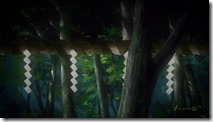 |
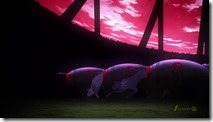 |
 |
 |
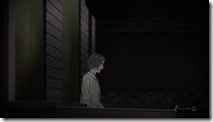 |
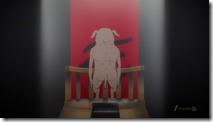 |
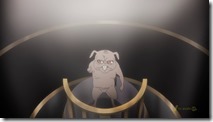 |
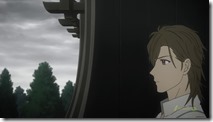 |
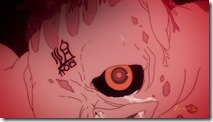 |
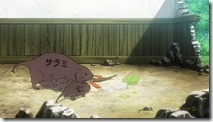 |
 |
 |
 |
 |
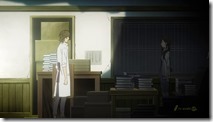 |
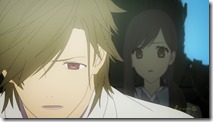 |
 |
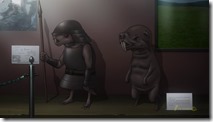 |
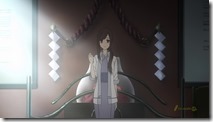 |
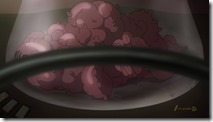 |
 |
 |
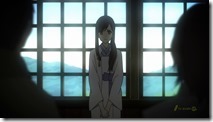 |
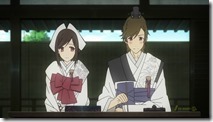 |
 |
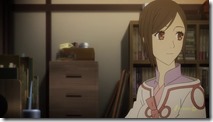 |
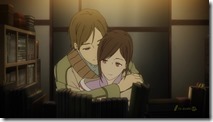 |
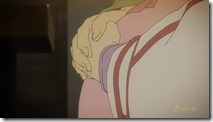 |
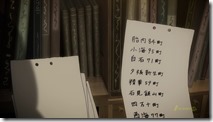 |
 |
 |
 |
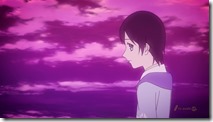 |
 |
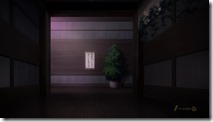 |
 |


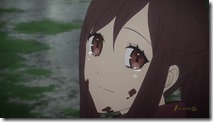
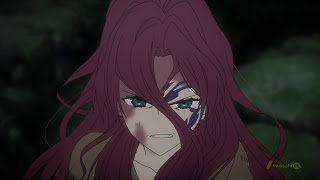
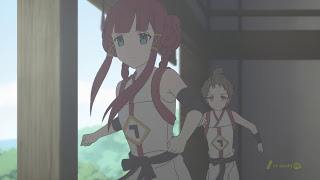
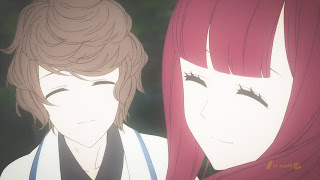

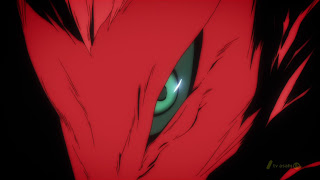
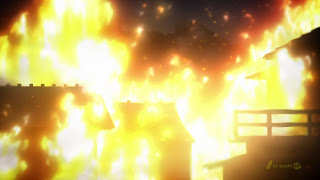
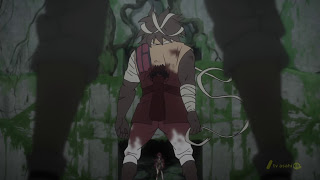
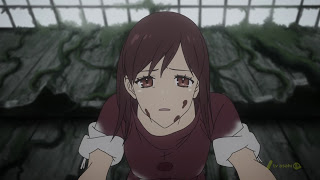
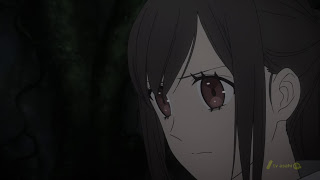
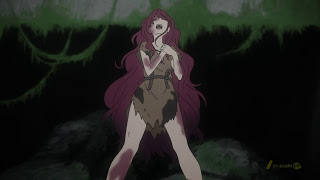
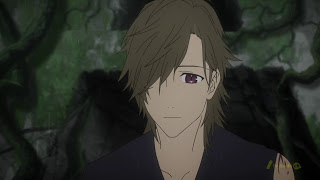
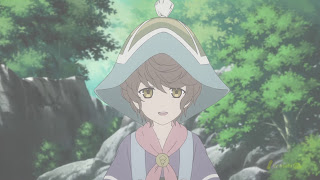
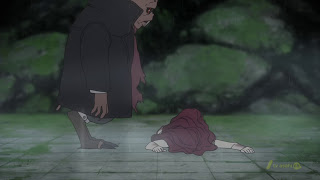


Kim
March 23, 2013 at 2:33 pmSSY was certainly an amazing experience.
But I hope there will be other strong contenders for best series of the year. After all we only finished the 1st season so far. That being said there is noting coming up in the spring that I can say might be it. I hope I am wrong though.
Ktullu
March 23, 2013 at 2:50 pmA truly unique series. After finishing the episode, it struck me that we probably won't get an anime like this for a long time. Its atmosphere, world, characters and plot were simply astonishing. The OST speaks for itself – the children chorus stuns me every time I hear it. Like you said, it's a pity that the creators had understated the Saki – Satoru relationship in the final arc, but that may be because of time contraints. As for the final episode, Squealer's words and actions were moving. He actually made me take the queerats' side in this conflict. Humanity got to show its cruel side again (via Eternal Hell) and did not really take the lesson of the war to heart (still won't regard queerats as an intelligent species). The ending itself did give some hope, but we won't know what happens next 🙁 Ehh, I miss this show already.
elianthos80
March 23, 2013 at 2:54 pmJust finished watching the episode. And while I agree on the issues you highlighted of the narrative going for a Maria and Mamoru's child dying scenario rather than saving her – oops, it was a girl then? :p – my gut reaction at the episode was 'well done' while fighting back a tear.
They manage to deliver an aftermath and allowed it to unravel at the proper pace, allowing for both the living and the dead to have their resolution and to linger within us. Great job. And no misplaced ED this week but a return of the Dvorak goodness plus flashbacks. That's good circular folks. Final seal of grace.
On the lighter side of things I must say both Satoru blushing at the wedding and the kittens were just so cute X,D. And the bg artists displayed some of their best skills this episode.
Again good job team SSY, good job.
And hat off to the blogger for the quality posts ;D.
Lacie Smith
March 23, 2013 at 3:58 pm"If you apologize first, that is. Apologize to all of my kind that you crushed mercilessly like worms beneath your feet."
This line is my favorite from this show. Queerats, or should I say humans without cantus, won’t rebel if they were not oppressed and treated lower than slaves. They are also humans. Anyway, that’s how today’s world works, countries against other countries, or factions against factions, killing one another without remorse. I don’t agree with “The ENDS justify the MEANS.”
Namikawa Daisuke or NamiDai is my pick for this year’s best seiyuu. Not only because Shinsekai won’t be Shinsekai if not for Squealer but also he gave him his own personality and to top it off, with a distinct voice only he can give.
Although I cannot forgive his chara for all the atrocities he had done, he’s still a contender for the best chara of 2013.
Shinsekai Yori will go down in my book as a permanent member of my top 10 anime of all time. Also my Best SciFi Anime in Recent Years.
The OST is, as you said, a stand out.
I'll miss this show. Thanks to the producers, writers, directors, animators, voice actors, and the original creator for giving us this show. Also, thanks for your quality posts GE.
Zeta Zero
March 24, 2013 at 12:32 pmObi-Wan Shun's appearance towards the end puts this squarely in Science Fantasy territory for me.
Not the masterwork I was anticipating at episode-01, but a valiant effort. Squealer/Yakomaru is a standout.
litho
March 23, 2013 at 4:19 pmStunning, from beginning to end. That's all I can say, really.
SSY did have flaws – the romantic relationship, the inconsistent animation styles early on, the boy whose name we all forgot till a few eps ago (though that might have been intentional), and for me, Maria not getting nearly enough closure – but it's been almost peerless in its ability to extract almost every emotion out of this viewer.
Having said that, I'm glad to see this end. It's been a pretty brutal ride. Nihilism from start to end.
The Queerat supporter in me feels shortchanged, though. Like Star Wars (the original trilogy) just ending after The Empire Strikes Back, with Squeeler-Luke losing to his 'father', Vader-Saki. The Queerats need their Return of the Jedi.
Anyways, I'm going to go detox with Shirokuma Cafe now.
Btw,
I think blogging this series has made Enzo a better writer as well.
kuromitsu
March 23, 2013 at 4:49 pmI'm going to miss the show, but I'm also going to miss reading your entries on it every week…
As for the meaning behind Saki realizing that the akki is not an akki after all – part of it was kind of lost in adaptation (since they never have a dialogue about it), which is that if he (her, whatever) is not an akki but a normal child then he's in a kind of reverse human-bakenezumi situation, or even worse since not even humans treat bakenezumi like this. Due to his anti-aggression mechanics, he's essentially a slave to bakenezumi, used as a tool of war to kill his own kind (whether he's aware of it or not). They can do whatever they want to him, and he's unable to fight back. And of course there's the more obvious tragedy of the kid not being an akki and them having to kill him anyway to ensure the survival of their society.
By the way, I can't agree with you in that the human civilization in the story is not worthy of survival. The humans we see in this story are all flawed in one way or another, but they're not the same humans who created the basis of their society. They're trying to survive, shouldering the sins of their ancestors.
Luxorcism
March 23, 2013 at 10:34 pmRofl aren't you the other WWII commenter on Animesuki? xD
And I think Enzo was only disapproving of the society we saw at the beginning of the series. It's fairly obvious Saki and Satoru are trying to change the system some way or another, in the hopes of creating a better world for their child to live in. Those "small scraps of decency," if Saki would have her way, should in time turn out for the better.
Alexandre Sobreira
February 5, 2014 at 9:20 pmYes, I agree. It's interesting that Asahina Tomiko had to die (she could have escaped with others that survive the akki-that-wasn't, but chooses to stay and confront it), since she was one of the pillars of the old order I Saki chooses to oppose by the end of the story. Tomiko has held back by the fear of the akki she had seen as a child, and could not/would change or see there was any other way to preserve their society. I believe also that the echoing laughter of children in the final frame tries to show Saki actually managed to change her society from one in which children were butchered out of fear into one in which they could be happy. After all, she was, I think, in a position of taking Tomiko's place, having been given a hint by her of the key to "eternal" life (that's how I see the scene where Tomiko explain to her what she had to do to regenerate her teleomeres).
In the end, this is one of the (very) few truly sci-fi anime I have ever seen. Zeta Zero said Shun's appearance after his death put the series in the realm of science fantasy, but I disagree: Shun himself explains he is just a small echo of his consciousness he had planted inside Saki, not a ghost or anything. If you have an explanation for it, it's sci-fi, if not, fantasy. I think SSY is perhaps the best purely sci-fi anime I have ever seen.
sonicsenryaku
March 23, 2013 at 4:51 pmI came into this finale with trepidation ad walked away moderately satisfied. This series received the closure it deserved; and while there were certain missteps throughhout the series that pulled me out of the experience every now and then, the compelling narrative and dark focus of the story kept me enraptured with the series. As the last seconds of the series played to dvorak's new world symphony, i could only think about how much i was going to miss this series. It was an emotional roller coaster every week, filled with surprise, intrigue, and panache that i have not seen in anime in so long. while not the masterpiece i was hoping it to be, this anime made me feel all sorts of powerful emotions and i thank it for that. If i had to give this series a score, it would be a solid 8.75 and a contender for my top ten anime. Here's hoping red data girl can somewhat fill my shin sekai yori fix this sprig season
elijah
March 23, 2013 at 4:58 pmOh man, I kinda miss the times when you did the series review and the last episode review in two different posts, because it allowed me to read reviews of shows I hadn't tried out yet without the fear of being spoiled. Is there any reason you've stopped this practice, other than the fact that it's probably a tad more troublesome?
admin
March 23, 2013 at 11:46 pmThat, and it seemed sort of artificial for me to separate my feelings about the finale from the series itself. I found myself wanting to weave the two topics together more than different posts would allow.
Scorpion Zero
March 23, 2013 at 5:10 pmThe scenes on episodes 1 and 2, showing the humans without cantus attacking the cantus users makes pretty much more sense now.The show was trying to tell us that the conflit between users and no users was already in action,culminating on the history showed to us.In the end,the ninja guys who died in that castle,were just trying to be recognized as equals,just like their predecessors did.
Rony Dony
March 23, 2013 at 6:19 pmIsn't it weird how Hanazawa basically played the exact same role in both this show and Zetsuen no Tempest?!
Hunter.Wolf
March 23, 2013 at 9:07 pmAmazing show and one hell of an amazing ending, so far the best ending among all the shows that are reaching their conclusions (Psycho Pass, Robotics;Notes), it really gives full closure and sums up all that was great about the series in a single episode.
It opens up with Kiromaru's noble sacrifice to help Saki and Satoru defeat the fiend, moves on the aftermath of the war and the short but thought-provoking trial and punishment of Squealer (whose performance in this episode particularly was ground-breaking), and finally to the revelation of the truth about Queerats, Saki having a one-sided nostalgic -and somewhat bitter- conversation with Squealer before giving him a merciful death, and finally Saki and Satoru marrying and having a child and hoping humanity will change to the better .. it couldn't have been better IMO.
The background art, direction and music seriously deserve a ton of praise and are a huge part (besides the story and dialog) that created the amazing atmosphere this series had, right down to the very last scene the gripping atmosphere never let go.
It is sealed, BEST anime of 2012 😉
Nic
March 23, 2013 at 10:22 pmThe kidnapped babies from the nursery still exist, queerrats still a potential threat.
Kim
March 23, 2013 at 10:27 pmOnce they no longer had to worry about being attacked by another human getting the babies back would not be an issue at all. They didn't tell us what happened but I think that was not needed.
Stöt
March 23, 2013 at 11:36 pmThis was the best anime for 2012 for me. The music and the atmosphere pulled me into this magical and disturbing dream world with a fantastic plot and I have nothing but superlatives to describe the pacing and the characters.
There is an oddity, and that's the Satoru-Saki relationship after the second timeskip, as Enzo writes. I guess it proves that this is the work of men, and not gods.
I will sorely miss this series, it feels a bit like finishing LOTR for the first time when I was a kid. The bitter tears that streamed down my face were not for the story, but because I would never experience the same world the same way again. I just feel terribly sorry for myself ^^
GlassShadow
March 24, 2013 at 1:37 amI had to wait for the series to progress far enough to marathon it because I didn't want the momentum to be disrupted by the time lapse. It's a masterpiece beginning to end, such a hauntingly beautiful anime. Thanks for your many insights Enzo! It has been a pleasure reading your review fot this series, I couldn't have said it better myself. The end indeed symbolized hope, and that is certainly something truly precious in an story so bleak.
Sauce
March 24, 2013 at 2:37 amI just have to say that I'm really glad that I gave this series a chance. I almost decided not to continue it early and what a mistake that would've been.
I do have one question though. Maybe there was a reason I can't think of, but if they can go so far as to change the genes of non cantus using humans to the extent that they did, wouldn't just giving them death feedback as well work better? I mean the cantus users wouldn't be able to to fully control and massacre them at will, but that isn't necessarily a bad thing. Nothing against the reasoning of the series of course, I'm just curious as to if this would have worked as a solution as well.
r3dking
March 24, 2013 at 5:12 amIt may be that the death feedback mechanism is itself a use of cantus.
kuromitsu
March 24, 2013 at 11:05 amThe death mechanism is basically people's unconscious using their power to commit suicide. It wouldn't work on people who don't have power.
Sauce
March 24, 2013 at 11:10 amAh, I for some reason I didn't remember that it had to do with their cantus. I just remembered the part that had something to do with dying of suffocation/seizure/heart attack, forgetting that it was brought on by their own cantus and not other means. Makes sense now.
r3dking
March 24, 2013 at 5:24 amBy the way, a truly minor quibble about the revelations at the end. Satoru's concluded that the bakenezumi were more human than molerat because the number of chromosomes matched the normal human complement rather than whatever molerats have. That reasoning is incorrect based on what we currently know of biology and evolution – the number of chromosome in a species is only weakly conserved. Consider that several human diseases (e.g. Downs Syndrome) involve having an abnormal number of chromosomes. Or consider that humankind's current closest neighbors – chimps, gorillas, orangutans, and bonobos (remember them?) – have 48 rather than 46. So as a hypothetical genetic engineering project it would probably be much easier to change the number of chromosomes in a mole rat than to replicate mole rat characteristics by wholesale replacement of human genes with mole rat equivalents.
sonicsenryaku
March 24, 2013 at 5:31 pmnot to mention that there are other species with 46 chromosomes as well; but i think what Satoru was trying to get at was the make-up of these chromosomes were closely related to human beings than molerat such as the number of genes contained within the chromosomes as well as base pairs and sequential pairs.
justinnm
March 24, 2013 at 7:12 amEven though I'll probably remember SSY as a super-overhyped series, man, this finale was really good. The ending seconds felt way more mature than the standard anime we watch nowadays.
SSY anime had some damn cool ideas, but plot-wise, it also had some painful holes everywhere. And yeah, Squealer's voice was definetly a standout for me too. Bring on more novel adaptations Japan; I'm sure they can do much better!
Carrie.Lyn
March 24, 2013 at 2:43 pmI'm so ridiculously conflicted! SSY had alot of flaws but it was also profound and cripplingly tragic…though honestly after all that I don't think 'humanity' deserves to survive at all. I might be human too but people suck :'( Thus while the ending was hopeful and adorable it also kind of felt out o place. Oh well, now to draw some angsty fan-art while I wait for another excellent anime like this to come along.
Highway
March 25, 2013 at 1:18 pmThanks for your posts on the show throughout its run. It was fun to read your thoughts, even though we usually fundamentally disagreed on the nature of the presented society.
Even the finale had some parts that really pushed buttons. Like Saki, I was repulsed by the bloodthirsty vindictiveness of the show trial of Squealer. But I was also hopeful that the knowledge that Saki and Satoru gained will try to move that society forward.
admin
March 25, 2013 at 3:07 pmYou're sincerely welcome. This series was one that really demanded to be written about at length and with some seriousness, which means that as with the watching the blogging was more intense than with any other show this year and maybe last.
Ronbb
March 26, 2013 at 6:11 amGreat review, Enzo, as always…I can feel your feelings towards the show while giving an objective analysis.
I can't say enough how much I love SSY, and it's rare to be able to enjoy such a beautiful craft. SSY has done many things right and brilliantly in almost every department, and I love how SSY has its strong plot and storytelling going without sacrificing the characters — I was on the edge of my seat for the past 6 months following the story while worrying about Saki, Satoru and others. I particularly love the BGM of SSY. It's almost just perfectly right for every scene with no lacking or overpowering — befitting the visual, the dialogue, the feelings of the characters, and the story, elevating the atmosphere, and amplifying the emotions of the viewers. You're right — now that it ended, it leaves a big void in me, too.
I personally like the ending. It's not as intense and dark, but it wraps everything up well while adding tiny doses of hope. The last sequence that played homage to the people passed away was very smart, but the quote on imagination as an epitaph was profound.
Most said — and I would agree, too — that Gen's work is thought-provoking, but I find SSY is even more so to me. This show sparked me into thinking about discrimination, humanity, sacrifices…
Some random thoughts…
– Kiromaru is such a noble-being…sad to see him die. Perhaps, the creator should add him in the sequence playing homage to those who sacrificed
– What an episode for Squealer…totally changed my view on him, while I still think that he's deceitful and cold-blooded…I guess a revolutionist needs to be like that to force a change…
– Yes, love, love, love those adorable kittens
– Happy to see that Saki and Satoru were finally together.
Thanks, Enzo, for blogging this show — I very much enjoyed the journey of SSY with LiA for the last 6 months.
Visicircle
January 19, 2014 at 2:49 pmDoes anyone else think this is a retelling of H.G. Wells 'Time Machine?'
Major spoilers below: You've been warned.
The godlike Cantus users are similar to the aristocratic Eloi in Wells's work. Both groups live in small, Utopian societies that initially appear peaceful. The Queerrats are the like the subterranean Morlocks; apparent slaves to the Eloi.
'From The New World' takes place 1000 years in the future. Similarly, the Time Machine's main action takes place in the future. Both societies are post-apocalyptic, with the ruins of our present civilization playing important roles in the story line.
Most importantly, in both story-lines the two major races share modern humans as their common ancestor. There are two different lines of evolution; one leading to beautiful and almost divine beings, the other line leading to ugly subhuman slaves.
I mean, the similarities are uncanny. Of course, many animes have done remakes of classic stories ('Samurai 7' comes to mind), so this in no way detracts from what is an incredible story in its own right.
Alexandre Sobreira
February 5, 2014 at 9:42 pmHowever, given their relative positions, the bakkenezumi would be closer to Eloi and the Humans to Mollochs, since Mollochs held all the power and kept Eloi as cattle for food. I don't really see much similarity appart from the 1000-year gap and the two species that are both humans, and that has been used before (even Evangelion has its share, as humans are in the end one of the Angels, so all characters are from the same species).
I believe what the story tries to do is explore the consequences of an esper-dominated world, and I think they do it magnificently. The author (didn't read the novels, so I'm talking about the anime here) managed to create a convincing future world without falling into the pitfalls of clichès so often adopted by eastern or western media/literature, like the idiocy of believing a future society would reverse to monarchy when democracy and capitalism are so much more efficient and benevolent. The society in SSY is plain, but not medieval: they have highly sophisticated social relations and extremely advanced science (cantus-controlled genetic engineering, for instance). The fact that they use myth and religion to control themselves is liked, I believe, with the fundamental assumption that akki and other aberrations in their past came from deranged minds or from unconscious manifestations of their psychokinetic power. These assumptions owe a lot to psychoanalysis. That the very existence of an unconscious mind as Freud and others imagined it is unscientific and has never been subject to scientific testing does not invalidate the series assumptions: it's sci-fi, not reality, after all. It's like the misconceptions about double personalities: they do not exist as such. No one harbors another person inside themselves, people only exhibit varying patters of personality which are dissociated from one another in behavior and accompanied by mental gaps, at least as far as we know. So, Shun, for instance, behaves in the series as though there was an "evil Shun" living inside him (his savage, destructive unconscious mind), but that is not true. His being aware of it would totally put him in control of it, unless he was actually deranged. And even then, medication would keep him under control. But, as I said, that is in reality. In fiction (as in Freud's work, which I read as just well-written fiction) you can have that, and no problem.
Jerimiah Wright
June 22, 2014 at 6:19 amWas there no meaning to Saki's realization that the child was no fiend but merely someone who – in Saki's own words – had "done nothing wrong" apart from a strategic one in figuring out how to kill it?
My take on it, was that the show was comparing the PK uses to the queerats. The akki was a literal switch in the roles of the two (Imagine the queerats had PK). The "done nothing wrong" part in my eyes, was a jab at the people who killed queerats without second thought. The humans were mortified by killing one of their own, but the thought of killing a queerat was simply a shared, common thought. No one was appalled by their deaths. That's also why, I believe that when Saki said "I don't know what's right anymore" – I figured that was what she was reffering to. Was the merciless killing of queerats a justice?
Well that was just my two cents on the topic. I thought Shenseki Yori was a great watch entierly, I have no qualms!
Jack Zhang
October 15, 2014 at 5:21 am"But it's also just more fuel to the fire, not the flame that started it – further evidence that the remains of human society have committed more than enough crimes to make them undeserving of survival."
I have to strongly disagree with your statement. While I respect your moral implications and reasoning, I believe the single one thing that this show has emphasized more than anything else is (like you mentioned directly or indirectly), the power to change and the hope that comes with simply being alive. Honestly, the very fact that Saki and Satoru is alive and can even hope about change makes it feel justified to me to have done all that and more if need be. My love for humanity is on par with Squealer and I have no doubt that I'd kill myself than remain as the last human alive for damn knows how long. Humanity must live. Humanity, or the human species as we know it (or how Satoru says something on the lines of "But do you consider them [queerats] as family?") must survive despite all odds. Everything else, all sacrifices included, are simply part of strategy.
…And on a parting note, morals can only exist if we do as we dedicate its very being 😉